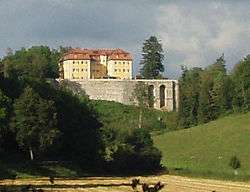Grafeneck Euthanasia Centre


The Grafeneck Euthanasia Centre (German: NS-Tötungsanstalt Grafeneck) housed in Grafeneck Castle was one of Nazi Germany's killing centres as part of their forced euthanasia programme. Today, it is a memorial site dedicated to the victims of the state-authorised programme also referred to since as Action T4. At least 10,500 mentally and physically disabled people, predominantly from Bavaria and Baden-Württemberg, were systematically killed during 1940. It was one of the first places in Nazi Germany where people were killed in large numbers in a gas chamber using carbon monoxide. This was actually the beginning of the Euthanasia Programme. Here was also settled the central office of "Charitable Ambulance Transport GmbH" (Gekrat),[1] which was responsible for the transport of T4 and was headed by Reinhold Vorberg.
Location
Grafeneck is a castle-like property in Grafeneck, a part of the municipality of Gomadingen in Baden-Württemberg.
History
Built around 1560, the Grafeneck Castle served as a hunting lodge for the Dukes of Württemberg. In the 19th century, it was used by the Forest Service. The Samaritan Foundation acquired it in 1928, setting up a handicapped home. In 1929, the charitable non-profit organisation Samariterstiftung established an asylum for disabled people. On 13. October 1939 Richard Alber, from 1938 to 1944 Landrat of district Münsingen, ordered that Schloss Grafeneck had to be cleared the next day. Four buses brought around 100 disabled men and few women from Grafeneck (together with 12 employees) to the monastery St. Elizabeth in Reute. All patients who were accommodated there survived Aktion T 4.
Modification of the building
From October 1939 to January 1940 former samaritanian pin was rebuilt to a killing area. In the castle were installed living and administration rooms, also a registry office and a police office. On the castle grounds was built a wooden hut with about 100 beds, a parking space for the gray buses, a crematory oven and a gasification shed. Moreover staff was recruited from Stuttgart and Berlin: doctors, police officers, clerks, maintenance and transport personnel, economic and domestic staff, guards and funeral torch. Between October and December 1939, only 10 to 20 people were in the castle, there were already about 100 men and women during the year 1940. The systematic murder under the T4 action started on 18 January 1940 in Grafeneck in a gas chamber camouflaged as a shower room, which was in a "garage": The prison doctor let flow by operating a manometer valve carbon monoxide into the gasification chamber. The steel cylinders required were supplied by Mannesmann, the filling was made by IG Farben in Ludwigshafen (BASF).[2] The first murdered patients were from the mental hospital Eglfing-Haar in Bavaria. The victims came from 48 institutions for handicapped and mentally ill: 40 from almost all districts of Baden-Württemberg, six from Bavaria and one each from Hesse and North Rhine-Westphalia.[3][4]
On 13 December 1940 the last victims were burned in the crematory. Killings with gas were performed between January and December 1940. Afterwards, it was used to house children and mothers with babies who had fled from Allied bombing. In Grafeneck Castle were killed during the Nazi Euthanasieaktion (later Action T4) 10,654 disabled and sick people through lethal injections and gas. The French occupying forces returned the site in 1946/47 to the Samaritan Foundation or Samariterstiftung, who re-established it as a centre for disabled and mentally ill people which still operates to this day. In the fifties, the development of the cemetery began as a memorial. In 2005, the documentation center Grafeneck Memorial was finally built.
_Dokumentationszentrum.jpg)
Documentation center Grafeneck The Grafeneck process presented in the summer of 1949, a total of 10,654 victims laid.
Offenders
The people who worked here overtook partially important jobs in the Nazi concentration camps.[4]
Administration
- Ludwig Sprauer, (1884-1962), highest medical officer of Baden, responsible for implementaation of „Euthanasie“-Programm in Baden.
- Otto Mauthe, (1892-1974), highest medical officer of Württemberg, responsible for "Euthanasie"-administration in Württemberg.
- Eugen Stähle, (1890-1948), medical officer in the Württemberg ministry of theinterior.
Doctors
The T4-organisators Viktor Brack and Karl Brandt arranged, that the killing of ill people was to be made only by medical staff, because of a letter from Adolf Hitler (1. September). The service of the gas tap was the task of the doctors. However it could happen when the doctors were not present or for other reasons the gas tap was operated by not medical staff. All doctors from Grafeneck used for correspondence code names.
In Grafeneck worked as killing doctors:
- Head, "medical director": Horst Schumann (1906-1983), ("Dr. Klein"): January, 1940 to the end of May/beginning of June 1940 later Sonnenstein Euthanasia Centre and camp doctor in Auschwitz-Birkenau
- Deputy: Ernst Tree Hard (1911-1943) ("Dr. Hunter"): from January 1940 to April 1940, from then senior doctor to December 1940 January to June 1941 in the same position in the killing institution Hadamar.
- Deputy: Günther Hennecke (1912-1943),25 April 1940 to December 1940; then held the same position in the killing institution Hadamar ("Dr. Fleck").
Management and other personnel
- "Office manager": Christian Wirth, the most important non-medical director of the killing center, responsible for the security, the Special Registry Office Grafeneck, were forged in the official death certificates, the staff and supervision of the murder operation itself.
- Deputy "office manager": Gerhard Kurt Simon ("Dr. Ott", "wedge"); Drawing as a "registrar" ("anger")
- First director of the Special Registry Office Grafeneck: Jakob Wöger, from December 1939 to June 1940 ("Haase")
Deputy Head of the Special Registry Office: Hermann Holzschuh, according Wögers leaving his successor ("Lemm")[5]
- "Burner": Josef Oberhauser, responsible for the burning of the bodies in the specially installed cremators.
- "Transport manager": Hermann Schwenninger, headed the transport squadron of "Gekrat", that brought the victims to Grafeneck
Literatur
- Ernst Klee: „Euthanasie“ im NS-Staat. Die „Vernichtung lebensunwerten Lebens“. S. Fischer Verlag, Frankfurt am Main 1983, ISBN 3-10-039303-1. – Standardwerk bis heute mit vielen Informationen über Grafeneck.
- Karl Morlok: Wo bringt ihr uns hin? Geheime Reichssache Grafeneck, Stuttgart 1985. – Erste kleine Monographie.
- (in German) Dokumente zur „Euthanasie“, Dokument 87, Frankfurt am Main: Fischer, pp. 232f., ISBN 3596243270
- Klaus-Peter Drechsel: Beurteilt Vermessen Ermordet. Praxis der Euthanasie bis zum Ende des deutschen Faschismus. Duisburg 1993, ISBN 3-927388-37-8.
- Roland Müller u. a.: Krankenmord im Nationalsozialismus – Grafeneck und die „Euthanasie“ in Südwestdeutschland. Stuttgart: Archiv der Stadt Stuttgart, Hohenheim Verlag. 2001. 150 Seiten, ISBN 3-89850-971-0.
- Henry Friedlander: Der Weg zum NS-Genozid. Von der Euthanasie zur Endlösung. Berlin Verlag, Berlin 2002, ISBN 3-8270-0265-6. – Ergänzung zu Klee. Gestützt im Wesentlichen auf Akten aus Ermittlungsverfahren und Prozessen, wird der enge Zusammenhang zwischen dem Krankenmord und dem Mord an den Juden in der „Aktion Reinhardt“ herausgearbeitet.
- Thomas Stöckle: Grafeneck 1940. Die Euthanasie-Verbrechen in Südwestdeutschland, 3. Auflage Tübingen 2012, Silberburg-Verlag, ISBN 978-3-87407-507-7
- Jörg Kinzig, Thomas Stöckle (Hrsg.): 60 Jahre Tübinger Grafeneck-Prozess: Betrachtungen aus historischer, juristischer, medizinethischer und publizistischer Perspektive. Verlag Psychiatrie und Geschichte, Zwiefalten 2011; ISBN 978-3-931200-17-6
- Henning Tümmers: Justitia und die Krankenmorde: Der „Grafeneck-Prozess“ in Tübingen. In: Stefanie Westermann, Richard Kühl, Tim Ohnhäuser (Hrsg.): NS-„Euthanasie“ und Erinnerung: Vergangenheitsaufarbeitung – Gedenkformen – Betroffenenperspektiven. Medizin und Nationalsozialismus 3, LIT Verlag, Münster 2011, S. 95–122; ISBN 978-3-643-10608-7
- Werner Blesch, Konrad Kaiser u. a.: Uns wollen sie auf die Seite schaffen. Deportation und Ermordung von 262 behinderten Menschen der Johannesanstalten Mosbach und Schwarzach in den Jahren 1940 und 1944 In: Mosbach im Dritten Reich. Heft 2, Mosbach 1993.
- Hans-Werner Scheuing: „…als Menschenleben gegen Sachwerte gewogen wurden.“ Die Anstalt Mosbach im Dritten Reich und die Euthanasie-Diskussion heute. 2. Auflage. Universitätsverlag Winter, Heidelberg 2004, ISBN 3-8253-1607-6.
- Franka Rößner: Opfer staatlicher Gewalt – Gedenkstättenarbeit am Beispiel Grafeneck. In: Siegfried Frech/Frank Meier (Hrsg): Unterrichtsthema Staat und Gewalt. Kategoriale Zugänge und historische Beispiele. Wochenschau-Verlag, Schwalbach am Taunus 2012, ISBN 978-3-89974-820-8, S. 117–137.
References
- ↑ Henry Friedlander: Der Weg zum NS-Genozid. Berlin 1997, ISBN 3-8270-0265-6, S. 314.
- ↑ grafeneck.finalnet.de: Endstation Grafeneck. Euthanasie auf der Schwäbischen Alb zur NS-Zeit.
- ↑ http://www.schule-bw.de/unterricht/faecheruebergreifende_themen/landeskunde/modelle/epochen/zeitgeschichte/ns/grafeneck/1hintergrundinfo.htm
- 1 2 badische-zeitung.de: Beginn des organisierten Massenmords Badische Zeitung, 17. Januar 2015
- ↑ Die Täter von Grafeneck - Seite des Landesarchivs BW, Mannheim
External links
| Wikimedia Commons has media related to Action T4. |
External links
| Wikimedia Commons has media related to Schloss Grafeneck. |
- Thomas Stöckle, Eberhard Zacher, Alfred Hagemann, Stefanie Esders (2000). "Grafeneck im Jahr 1940" (PDF) (in German). Landeszentrale für politische Bildung Baden-Württemberg. Retrieved 2016-05-31. mit Zeittafel, Fotos und weiterführenden Literaturhinweisen
- „Die Wege zur ‚Euthanasie‘ im NS-Staat und ihre Verwirklichung in der Tötungsanstalt Grafeneck“, Anna Ketterer, PH Reutlingen, Seminararbeit, WS 2004/2005, pdf-Datei, 42 S.
- „Tötung in einer Minute.“ Quellen zur Euthanasie im Staatsarchiv Ludwigsburg, virtual exhibition
- Files of the so called Grafeneck-Process to „Euthanasia“ before the court of Tübingen 1949 as digital reproduction Online-offer Staatsarchiv Sigmaringen
- Final station Grafeneck – „Euthanasia“ at Grafeneck castle 1940
- 2009 – 70 years after euthanasia murders in Grafeneck: „trace of rememerance“ A colour track between the place of the victims and the offenders in the ministery of the interior in Stuttgart.
- Übersicht der deutschen Gedenkstätten, ns-gedenkstaetten.de
- Projekt: Gedenken an Anna, Plan, Fotoserie von heute u. a.
- The grey busses a journey to the uncertain
Coordinates: 48°23′33″N 9°25′45″E / 48.39250°N 9.42917°E

